Times Change, No. 5
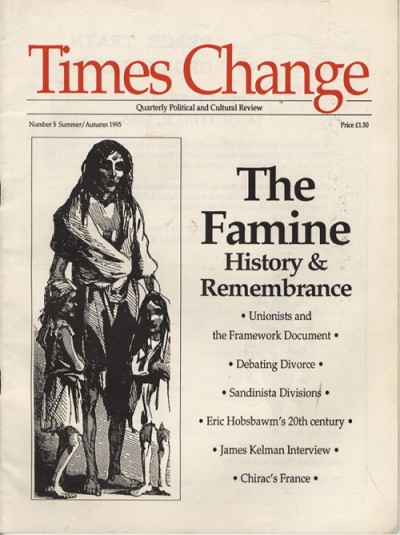
| Date: | 1995 |
|---|---|
| Organisation: | Democratic Left |
| Publication: | Times Change |
| Issue: | Number 5 Summer/Autumn 1995 |
Contributors:
Info | Arthur Aughey, Sylvie Batt, Fiachra Ó Ceilleachair, Peter Connell, Prionsias Ó Drisceoil, Eric Hobsbawm, Henry Patterson |
| Type: | Publication Issue |
| View: | View Document |
| Discuss: | Comments on this document |
| Subjects: | Northern Ireland Framework Documents, 1995 Divorce Referendum, 1986 |
Please note: The Irish Left Archive is provided as a non-commercial historical resource, open to all, and has reproduced this document as an accessible digital reference. Copyright remains with its original authors. If used on other sites, we would appreciate a link back and reference to The Irish Left Archive, in addition to the original creators. For re-publication, commercial, or other uses, please contact the original owners. If documents provided to The Irish Left Archive have been created for or added to other online archives, please inform us so sources can be credited.
Commentary From The Cedar Lounge Revolution
23rd March 2009
The quantity of Democratic Left material in the Archive is fairly limited. However, due to a donation some time ago of a series of “Times Change”, the DL’s political and cultural review (which I have yet to return - so an address would be handy!) which are now scanned in that is set to change.
This Summer/Autumn edition appears at a particularly interesting time not least since the IRA ceasefires had occurred fairly recently. And the approach of Democratic Left to this development is best characterised in an editorial under the heading of “The Art of compromise” which is profoundly negative of the outcome.
Reading it at this remove it is remarkable how pessimistic a view of the capacity of others to change as DL had was intrinsic to their analysis. So we read that:
…what is the Republican Movement prepared to do to move the peace process forward? Decommission arms? No. Stop punishment beatings? No. Release the bodies of the disappeared? No. Agree to reform of Articles 2 and 3? No. Agree to the principle of unionist consent? No.
A piece by Arthur Aughey on the response of Unionism to the developments is equally pessimistic in tone. Indeed he argues that:
The frameworks have proposed some half-way house between unionism and nationalism, thereby equating the fact of the Union with the aspiration to Irish unity (without a proper deal on Articles 2 and 3). That is what Dick Spring understands ‘balance’ to mean. For the reasons I have outline, such a balance is unacceptable to unionists and will not achieve widespread acceptability. There needs to be fresh thinking.
Again, an intriguing analysis in the context of what has happened since.
Central concerns of Democratic Left including a leftist internationalism are seen in pieces on Nicaragua and France. An emphasis on social liberalism is articulated in an article on divorce, and it is notable that James Kelman is interviewed in this issue. There is an interesting, and perhaps somewhat unexpected, short appraisal of Roy Foster’s approach to the Famine in an article by Peter Connell which chastises historical revisionism in this context for ‘blurring the Famine’s impact…’. This is in addition to an article on the meaning of Famine commemoration by Proinsias O Drisceoil which makes some contentious assertions.
All told a useful insight into the party at that point in time.
This text and these files are a resource for use freely by anyone who wants to for whatever purpose - that’s the whole point of the Archive (well that and the discussions). But if you do happen to use them we’d really appreciate if you mentioned that you found them at the Irish Left Online Document Archive…
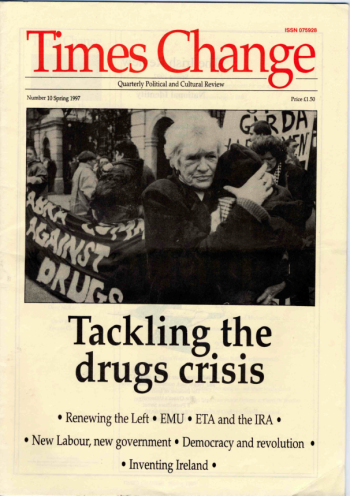
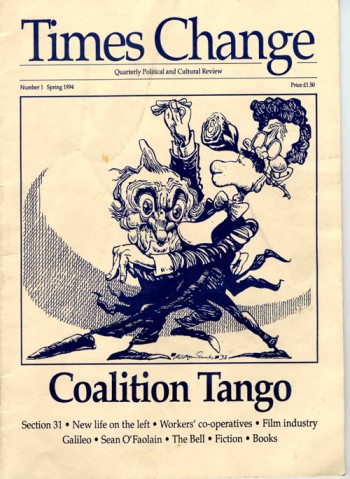
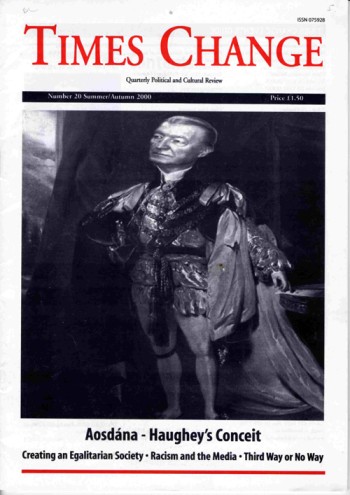
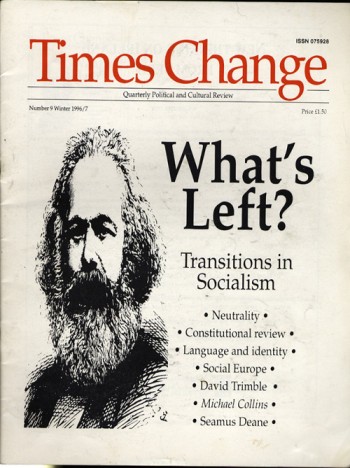
Comments
No Comments yet.
Add a Comment
Comments can be formatted in Markdown format . Use the toolbar to apply the correct syntax to your comment. The basic formats are:
**Bold text**
Bold text
_Italic text_
Italic text
[A link](http://www.example.com)
A link
You can join this discussion on The Cedar Lounge Revolution
By: Baku26 Sat, 28 Mar 2009 20:34:32
At 38 Eamonn derides Joe for alleged bitterness. Perhaps he should read his own post at 41 for a fine example of that genre. For a good example of active collusion with the British forces against Republicans he might like to acquaint himself with the Provo role in the so-called “Incident Centres” in the early 70’s.
Reply on the CLR
By: Garibaldy Sat, 28 Mar 2009 21:01:35
I think that it was clear that there would continue to be organised resistance, and that was liable to grow as they accelerated the move to the right. And the DLers knew it. Hard to say though.
Reply on the CLR
By: Joe Mon, 30 Mar 2009 15:27:22
Post 38: Bitterness through lifelong failure.
You got me in one Eamonn. But… there’s a turn in every road – I succeeded in getting you ranting in anyway.
Here’s to further successes going forward.
Although I love that line so much. Has the WP come up with a slogan for the forthcoming locals down here Gari? Cos there’s one you just couldn’t pass up:
Vote WP
Bitterness through lifelong failure
Reply on the CLR
By: Maddog Wilson Mon, 30 Mar 2009 15:53:03
Joe do you know how many candidates the WP are standing outside of Cork and Waterford there is nothing on their website yet?
Reply on the CLR
By: Joe Mon, 30 Mar 2009 16:21:44
Maddog you know as much as me. I think there was something on another thread here a while back about 4 candidates in Dublin. Why not email them?
Reply on the CLR
By: Maddog Wilson Mon, 30 Mar 2009 16:39:40
Thanks Joe.
Reply on the CLR
By: Starkadder Sat, 11 Apr 2009 22:04:03
I was flicking thru “Sinn Fein and the Politics of Left Republicanism”
today and there was a section on the whole OSF/WP/DL history,so
I might buy it to learn more.
Reply on the CLR